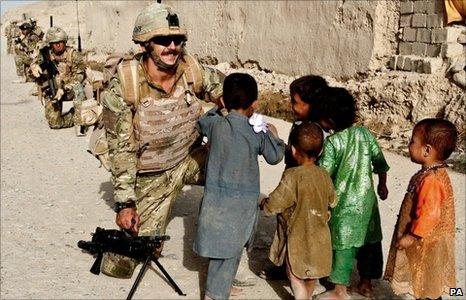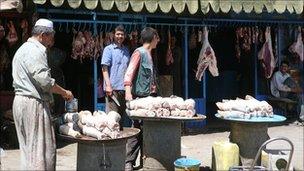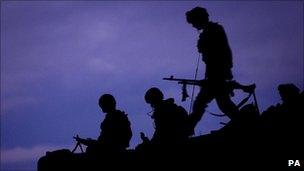Afghans on UK handover to US in Sangin
- Published

The UK has suffered a third of its Afghan combat losses in Sangin
There has been a mixed reaction from Sangin residents to the transfer of security from British to American forces in the Helmand district.
The handover to US Marines marks the end of the British mission in Sangin, after four years and more than 100 UK lives lost.
''It makes no difference," said Sangin resident Wali Shah. "They are both the two ears of the same horse. They don't care about us because they are more concerned about securing their own interests."
British forces fought a bitter counter-insurgency campaign against the Taliban in Sangin.
But Abdul Manan, a shopkeeper in the dusty market town of Sangin, which shares the name of the wider district, did not think the UK mission had changed much for the better.
''British troops didn't have any major success or a significant achievement," he said. "They came and made big promises but brought violence and displaced a lot of people.''
Sangin - situated around 100km (62 miles) north-east of the provincial capital, Lashkar Gah - is a hotspot for insurgent violence and opium production.
"The security situation was much better before the arrival of British forces," said Khairullah, a local farmer. "We couldn't go to work. We hope that it will get better soon."
'Americans don't care'
However, tribal elder Muhammad Khan says British troops were mindful of local culture, and treated people well.
''The former infidels [British] were better than these new ones [Americans]," said Mr Khan.

A number of people had left the town of Sangin as a result of fighting in recent years
"Britons were respectful of our culture and traditions. They wouldn't search someone on a motorcycle with his wife in the back seat.
''But American troops don't care. They stop us and search both man and his woman. This is what we know of Americans.''
A number of residents have reservations about the arrival of US forces.
Gul Muhammad, from Sangin town, said: ''I liked the way British soldiers conducted operations.
"After they were attacked, they would go to the exact house and target the very attacker without harming others."
Another resident expressed his concerns about civilian casualties.
''Americans behave differently," said Aazar Gulalai. "They attack indiscriminately and target everybody in the vicinity after they are targeted by the Taliban, or suffer casualties in a mine explosion.
''All of them shoot at us. They all target us. We and the Taliban become the same for them after they are attacked.
''We are civilians. We don't have any animosity with the Taliban, or government.''
Sangin is one of the most heavily populated districts in Helmand, with a population of around 150,000.
But a number of people left the town of Sangin in recent years as a result of fighting. One of them, Abdul Wali, hopes that he will be able to return home soon.
''We left Sangin because of continual attacks and fighting," says Abdul Wali. "I hope Americans will bring security with them and schools will be opened."
Over the past few months, Americans have already taken on security responsibility for many other districts in Helmand, including Nawa, Garmsir, Marjah, Khanshin and Nawzad.
'Couldn't handle casualties'
A number of people in these districts claim that British forces failed to bring security there because they did not want to risk fighting the Taliban.
''Americans are serious," says Muhabbat Khan, a resident of Nawa district. "Security is much better now here. The British were only concerned about their on security.

The Royal Marines are being redeployed elsewhere in Helmand province
''British troops couldn't handle casualties. They used to retreat all the time and this would further embolden the Taliban.''
A few residents of Sangin expressed hope that Americans would bring not only security to their district, but much needed development and jobs for the people.
''We are poor people and fighting has destroyed our businesses and livelihoods," said Haji Naik Muhammad, a tribal elder in Sangin district.
"The British didn't have money to spend. How can they kill the thirst of others if they are thirsty themselves?
''We hope America will spend a lot of money to improve our lives.''
All names in this article have been changed to protect anonymity.